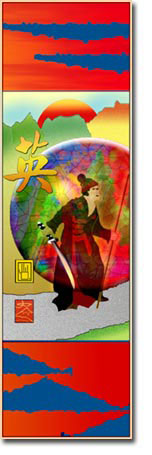On The Way: The Daily Zen Journal
Wonder
Foyan (1067-1120)
Association with good companions is a serious recommendation of the ancient sages. Students today should follow the words of the Buddhas and Patriarchs; if you want to clarify this matter, you must arouse wonder and look into it.
If you wonder deeply about this matter, transcendental knowledge will become manifest. Why? The task of the journey just requires the sense of doubt to cease. If you do not actively wonder, how can the sense of doubt cease?
There are examples of how perfectly realized people never utter a single word or half a phrase without purpose. Whenever they try to help others, they never give random instructions, and they did not approve people arbitrarily.
Nowadays there are teachers all over who sometimes speak correctly and sometimes speak without a grasp. Why? Because they have not yet attained perfect realization. Sometimes they approve people and say they are right, but then sometimes they say they are not right; how is it possible to clarify “from birth to death, it’s just this person” in such a manner?
When you look closely, you see that people of the present are none other than people of yore, and the functions of the present are none other than the functions of the past; even going through a thousand changes and myriad transformations, here it is just necessary for you to recognize it first hand before you can attain it.

The reason people today cannot attain it is just because they do not know how to distinguish it with certitude. How is it that they cannot distinguish it with certainty? They just make up interpretations of ancient sayings, boring into them subjectively. If you just do this, you will never understand. Why? I tell you, if you “turn your head and revolve your brains,” you’re already wrong.
The most economical way here is to save energy, not asking about this and that but clearly apprehending it in the most direct manner. You people first came forth with rationalizations, using ancient sayings to wrap and bind yourself. It’s like scattering a handful of dirt on a clean surface.
How can I blame you? The ancients were so compassionate as to tell you, “Walking is Buddha walking; sitting is Buddha sitting; all things are Buddha teaching; all sounds are Buddha’s voice.” You have misunderstood, supposing all sounds are actually the voice of Buddha and all forms are really forms of Buddha. Since it is not admissible to understand in this way, then what would be right?
I tell you, the instant you hold onto sayings, you’re already alienated; when you want to manifest it by means of the light of knowledge, you’ve already obscured it. Now, don’t hold onto my talk; each of you do your own work independently.
You may contemplate the stories of the ancients, you may sit quietly, or you may watch attentively everywhere; all of these are ways of doing the work. Everywhere is the place for you to attain realization, but concentrate on one point for days and months on end, and you will surely break through.
The spiritual light, shining independently,
Transcends the senses and objects;
The essence is revealed, real and eternal,
Not confined to written words.
The nature of mind has no stain;
It is basically complete of itself.
Just detach from false mental objects
And be enlightened to being-as-is.
Baizhang
Keys of Zen Mind
When you find peace and quiet in the midst of busyness and clamor, then towns and cities become mountain forests; afflictions are enlightenment, sentient beings realize true awakening. These sayings can be uttered and understood by all beginners, who construe it as uniform equanimity; but then when they let their minds go, the ordinary and the spiritual are divided as before, quietude and activity operate separately. So obviously this was only an  intellectual understanding.
intellectual understanding.
You have to actually experience stable peacefulness before you attain oneness; you cannot force understanding. In recent generations, many have come to regard question and answer dialogues as the style of the Zen school. They do not understand what the ancients were all about; they only pursue trivia, and do not come back to the essential. How strange!
People in older times asked questions on account of confusion, so they were seeking actual realization through their questioning; when they got a single saying or half a phrase, they would take it seriously and examine it until they penetrated it. They were not like people nowadays who pose questions at random and answer with whatever comes out of their mouths, making laughingstocks of themselves.
People who attain realization study the path twenty-four hours a day, never abandoning it for a moment. Even if these people do not gain access to it, every moment of thought is already cultivating practical application.
Usually it is said that cultivated practice does not go beyond purification of mind, speech, action, and the six senses, but the Zen way is not necessarily like this. Why? Because Zen concentration is equal to transcendent insight in every moment of thought; wherever you are, there are naturally no ills.
Eventually one day the ground of mind becomes thoroughly clear, and you attain complete fulfillment. This is called absorption in one practice.
Nowadays people only work on concentration power and do not open the eye of insight. For them, stories and sayings just become argumentation, unstable mental activity.
Zen study is not a small matter. You do not yet need to transcend the Buddhas and surpass the adepts; but once you have attained it, it will not be hard to transcend and surpass them if you wish.
Foyan (1067-1120)
Excerpted from Instant Zen – Waking up in the Present -Translated by Thomas Cleary 1991




Master Foyan begins this talk emphasizing the value of good companions and warning us about the varying quality of teachers back then in the 1100’s. It is amazing how similar students and teachers of all times are. There are those who can lead you astray in any lifetime, and those that draw you nearer to truth.
We are also being asked to look at how easily we fool ourselves in practice, how shallow our attempts can be at times. Foyan encourages independence and freedom of direct experience in students. “All he wanted was for people to open their own eyes and stand on their own two feet, to see directly without delusion and act on truth without confusion.”
Sometimes it seems like a kind of heroic act to maintain one’s own heart/mind in practice. We confuse a kind of deference to a teacher, offering blind obedience, with true commitment, thus abandoning our own clear perceptions at times. Anyone at any stage of practice has the ability to see clearly. We need only to slow down enough to pause to allow this process to happen. Often we are clouded by our own ideals and dreams of a life of practice to face the realities at times.
At the end of Buddha’s life he left the monks and nuns with the blessing to “be a light unto yourselves.” That says volumes for the student comfortable with a kind of divine trust in the Way that goes beyond the limitations of any teacher.
Trusting in the Now,
Elana, Scribe for Daily Zen